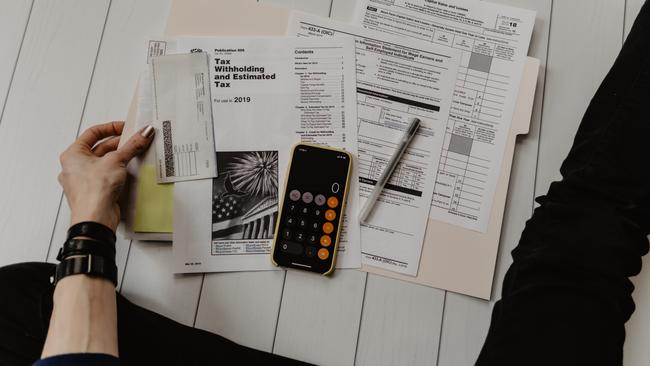Common tax mistake that cost couple $8000 a year
An Australian couple saving for their dream home got caught in a tax trap that’s all too common – and it cost them dearly.
Money
Don't miss out on the headlines from Money. Followed categories will be added to My News.
In Australia we pay a lot of tax, and every dollar of tax you save is an extra dollar you can invest to get ahead faster, or spend to enjoy your lifestyle a little more.
But the tax rules are complicated and can be confusing, and it’s easy to end up overwhelmed. Being smart and strategic with your tax can then end up in the too hard basket, and you can end up leaving a heap of money on the table.
This happened to a couple I recently worked with, but they turned things around and used the rules to their advantage to fast track their progress towards buying their dream home.
Emma and Andrew* were expats in their early 30s earning solid incomes. They were saving strongly at $3000 per month, but really wanted to buy their dream home which didn’t seem possible without a crippling mortgage.
When we started working together, they called out the fact they knew they wanted to save tax – but they had no idea how to do it.
We spent some time together diving into what they were doing and realised they were missing a trick.

When we went through the money decision making and planning process they realised that with a couple of small tweaks they could hold onto more of their income, reduce their annual ATO donation, and use that money to fast track their wealth building and buy their dream home sooner.
The results?
They saved over $8000 in tax through the next 12 months alone, adding extra money to their bottom line to further grow their investments and get ahead.
How to save on tax
In her 20s, Emma had opened up an investment account that she was using to do a fairly small amount of investing. The account seemed to work pretty well and her investments slowly grew. She wasn’t investing a lot so the growth wasn’t huge, but she was happy with how it was working.
Years later when it came time to get more serious about her investing so she and Andrew could build the deposit for their dream home, Emma had the account ready to go and decided to use it for their future investments.

Over time, the investment account built up to a really solid $445,000, which based on the long term sharemarket return of 9.8 per cent was generating an annual return of around $43,610.
But this income was taxable, which based on Emma’s marginal tax rate of 47 per cent, meant tax on this income of around $20,500 each year.
This still left them with $23,110 in after tax returns each year, so while they knew they were paying a chunk of tax, they were pretty happy with the outcome.
But they both didn’t realise the results could be so much better …
Who owns your investments is important
This is an important consideration for any investor, but in particular in couples and families, getting this right can either save or cost you a bunch of tax.
Investment income is taxable
When you own investments in your personal name, all income earned through dividends and capital gains adds onto your personal ATO assessable income, then taxed at your marginal tax rate.
Because of the difference in marginal tax rates within couples and family units, the implication is that having the same investments owned by different people can lead to different tax outcomes, and a different after tax investment return.
Tax rates are different throughout family units
I’ve included an example below showing the tax rates available for an example family and the different tax structures and tax rates they could use to invest.
* MTR: marginal tax rate
You can see from the above, that the difference between paying tax at the highest rate (and therefore the potential tax saving) across these groups compared to the lowest is $4700, which is money you could use to grow your investments faster.
Your after tax return is all that matters
If your aim is to seriously invest and build a solid second income from investments, over time you will build a substantial income stream from investments. Your investment returns are all important and the higher your investment return, the faster you’ll get ahead.
But you should know the only investment return that really matters is your after tax return. This is how much you have leftover after your ATO donation, which is the amount of money your investments will generate either for you to spend on your living expenses, or reinvest to continue growing your investments and wealth.
It’s easy and common to focus on the headline return on your investments. While this return is important, it’s not as important as your after tax return.

For Emma and Andrew, they had fallen into a common trap that was leading to their after tax investment return being much lower than it could have been.
It’s common in couples for one person to be more interested in investing, more confident around taking action, and for that person to end up being the ‘driver’ of investing within a couple. For these guys, Emma was that person.
The issue with this is that Emma had a higher income than Andrew ($200k vs. $60k), so was paying tax at the top marginal tax rate of 47 per cent compared to Andrew’s marginal tax rate of 34.5 per cent.
This meant more tax being paid on investments owned in Emma’s name, than if the same investments were owned by Andrew.
As a result, as their investments grew, the extra unnecessary tax they were paying also grew.
You can change things
For Emma and Andrew, after going through the process of understanding their options and what was actually possible, they realised that by moving their investments to Andrew’s name, they’d save thousands of dollars in tax – every single year.
Moving investments can have tax consequences
You should be aware that any time you sell investments, you have to pay tax on any increase in the value of your investments (gains) made. This means it can actually cost you a lot of tax to sell down investments and move them to your partner.
Fortunately for Emma and Andrew, with the recent share market disruption their investments didn’t have any large gains attached to them – meaning they were able to move their investments without paying a bunch of extra tax.
As a result, on the annual investment income of $43,610, Andrew only had to pay tax of $15,045 compared to Emma’s tax bill of $23,110, resulting in an annual tax saving of over $8000 every single year.
The lesson here is that understanding the tax rules before you invest is always better, so you can make sure things are structured in the best way from the start and avoid paying unnecessary tax in the future.
The wrap
Through the tactics we put in place, Emma and Andrew were able to save a heap of tax and create a pathway to buying their dream home without a crippling mortgage. They used the rules to their advantage to get their money working smarter, not harder.
But the rules can be complicated and confusing, and for busy people with busy lives it’s easy to make your money and investing moves without really understanding how they will play out into the future.
But getting this right can come with some serious upside, so it’s worth taking the time to make not only good choices, but the best choices for you.
Ben Nash is a finance expert commentator, podcaster, financial adviser and founder of Pivot Wealth www.pivotwealth.com.au, and the Author of the brand new book, ‘Replace your salary by Investing’. Ben is also the host of the How to be Successful with Money podcast.
Ben runs regular free online money education events to help you make better money choices and get ahead faster. You can check out all the details and book your place here
Disclaimer: The information contained in this article is general in nature and does not take into account your personal objectives, financial situation or needs. Therefore, you should consider whether the information is appropriate to your circumstances before acting on it, and where appropriate, seek professional advice from a finance professional.
* Names have been changed.
Originally published as Common tax mistake that cost couple $8000 a year





